Many fewer whites report being personally discriminated against
For immediate release: November 7, 2017
Boston, MA – This report is part of a series titled “Discrimination in America.” The series is based on a survey conducted for National Public Radio, the Robert Wood Johnson Foundation, and Harvard T.H. Chan School of Public Health. While many surveys have explored Americans’ beliefs about discrimination, this survey asks people about their own personal experiences with discrimination.
Key issues of concern for whites facing discrimination: jobs and college
People were asked, “Generally speaking, do you believe there is or is not discrimination against white people in America today?” Overall, 55% of white Americans believe there is discrimination against white people today (Chart 1), while 43% of whites do not believe such discrimination exists.
However, when asked if they had ever been personally discriminated against because they are white, many fewer said yes. Chart 1 shows that 19% of white Americans say they have been personally discriminated against because they are white when applying for jobs, and 13% say they have been discriminated against when it comes to being paid equally or considered for promotions. Among whites who had ever applied to or attended college, 11% say they have been personally discriminated against because they are white when applying or attending. One in ten say they have been discriminated against when interacting with the police.
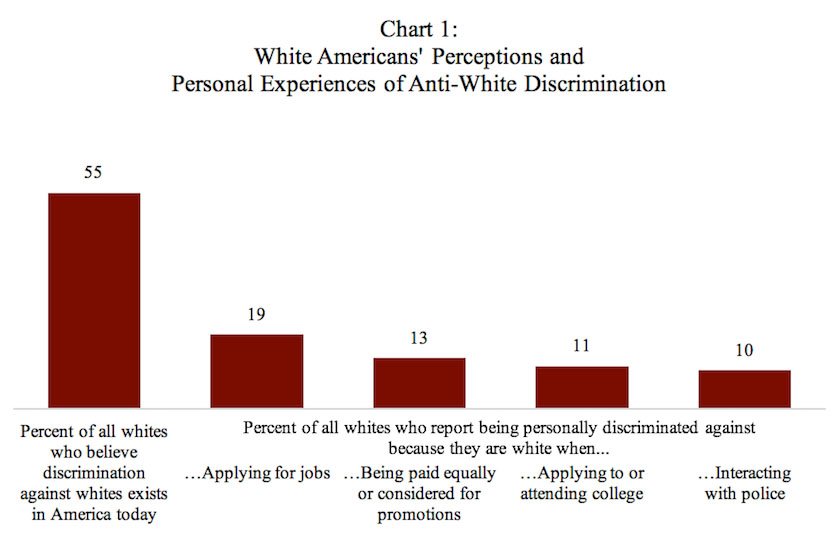
“What’s striking about these findings is the significant gap between many white Americans’ general belief that white people are discriminated against in America, and their relatively limited reporting of being personally discriminated against in their own lives,” says Robert Blendon, co-director of the survey and the Richard L. Menschel Professor of Health Policy and Political Analysis at Harvard T.H. Chan School of Public Health.
Whites who believe discrimination against whites exists in America today more frequently report personal experiences of discrimination
As shown in Charts 2 and 3, whites who believe discrimination against white people exists today are significantly and consistently more likely to report that they themselves have been personally discriminated against, compared to whites who do not believe discrimination against white people exists today. Importantly, these data cannot say whether the general belief that anti-white discrimination exists causes a higher likelihood of perceiving personal experiences as discriminatory, or if personal experiences of discrimination cause a higher belief in widespread discrimination against whites.
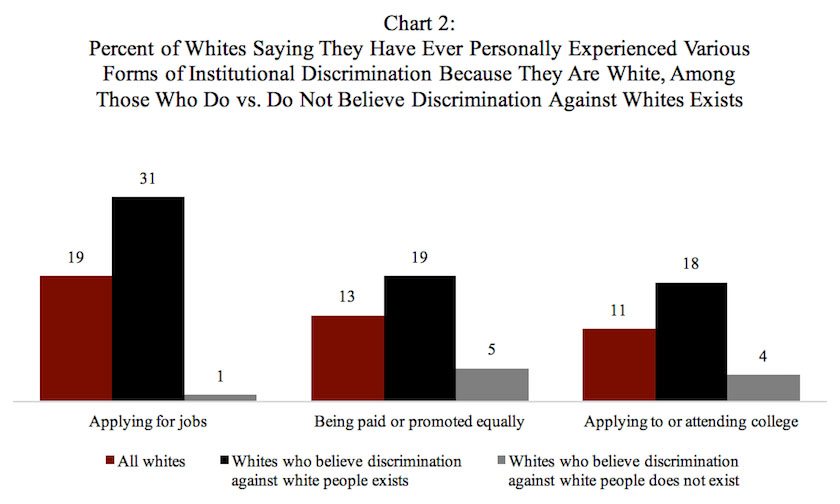
As Chart 2 shows, in the context of institutional discrimination, whites who believe anti-white discrimination exists are most likely to say they have been personally discriminated against because they are white when applying for jobs (31%), when being paid equally or considered for promotions (19%), and when applying to or while attending college (18%). In each case, only 5% or fewer whites who believe discrimination against whites does not exist say they have had these experiences.
Chart 3 shows that whites who believe in anti-white discrimination are also more likely to report they have personally experienced various forms of individual discrimination, including slurs and insensitive or offensive comments about their race or ethnicity.
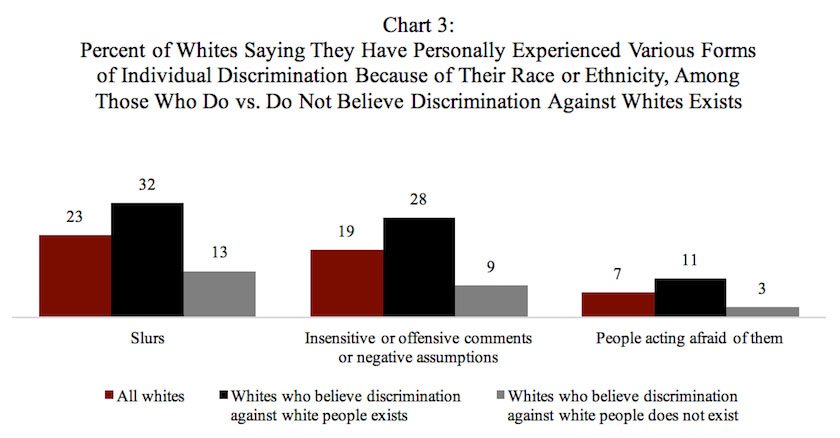
Among all white Americans, whites are most likely to say they have been personally discriminated against because they are white in the workplace and at college
In the context of institutional forms of discrimination, the top three situations where white Americans say they have been personally discriminated against because they are white are when applying for jobs (19%), being paid equally or considered for promotions (13%), and when applying to or while attending college (11%) (Chart 4).
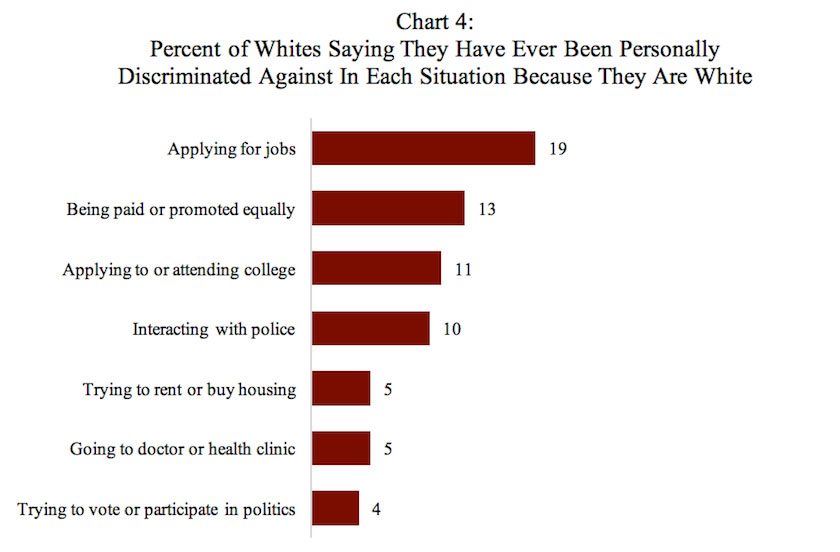
Roughly one in five whites have experienced slurs or insensitive comments about their race or ethnicity
In the context of individual or interpersonal forms of discrimination, roughly one in five white Americans say they have personally experienced people using slurs (23%) or making insensitive or offensive comments about their race or ethnicity (19%) (Chart 5).
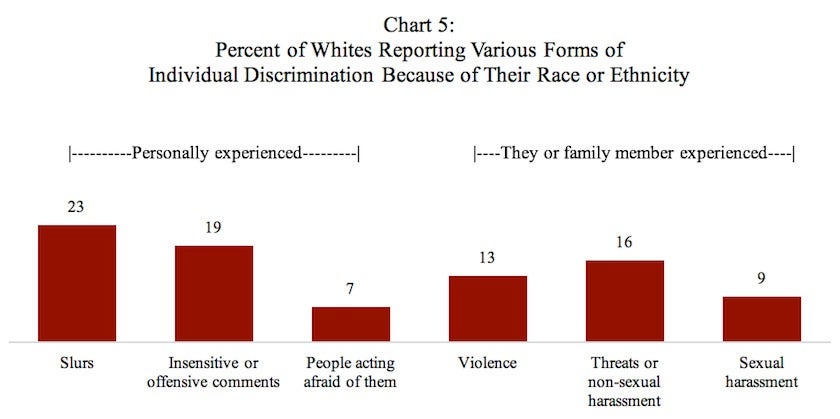
Additionally, 16% say that they or a family member have experienced threats or non-sexual harassment because they are white (Chart 5).
Low income whites more likely to say they have avoided medical care due to concern they would be discriminated against because they are white
In the context of health care, only 5% of whites say they have been personally discriminated against because they are white when going to a doctor or health clinic (Chart 4).
Additionally, only 3% of whites say they have avoided seeking medical care for themselves or a member of their family out of concern they would be discriminated against or treated poorly because they are white. However, white Americans making under $25,000 per year are more likely to say they have avoided medical care (9%) out of concern they would be racially discriminated against, compared to 0% of white Americans making $75,000 or more per year.
A majority of white Americans believe discrimination against whites exists today
Overall, 55% of whites believe that discrimination against whites exists in America today. Among those who believe such discrimination exists, a majority (61%) say that discrimination based on individuals’ prejudice is the larger problem, while 26% say discrimination based in laws and government policies is the larger problem. Another 11% say both forms of discrimination are equally a problem.
Survey Background
The survey was conducted January 26 – April 9, 2017, among a nationally representative, probability-based telephone (cell and landline) sample of 3,453 adults age 18 or older. The survey included nationally representative samples of African Americans, Latinos, Asian Americans, Native Americans, as well as white Americans; men and women, and LGBTQ adults. This report presents the results specifically for a nationally representative probability sample of 902 white U.S. adults. Other reports analyze each other group, and the final report will discuss major highlights from the series.
For more information:
Todd Datz
617.432.8413
tdatz@hsph.harvard.edu
Photo: iStock
Visit the Harvard Chan School website for the latest news, press releases, and multimedia offerings.
###
Harvard T.H. Chan School of Public Health brings together dedicated experts from many disciplines to educate new generations of global health leaders and produce powerful ideas that improve the lives and health of people everywhere. As a community of leading scientists, educators, and students, we work together to take innovative ideas from the laboratory to people’s lives—not only making scientific breakthroughs, but also working to change individual behaviors, public policies, and health care practices. Each year, more than 400 faculty members at Harvard Chan School teach 1,000-plus full-time students from around the world and train thousands more through online and executive education courses. Founded in 1913 as the Harvard-MIT School of Health Officers, the School is recognized as America’s oldest professional training program in public health.
